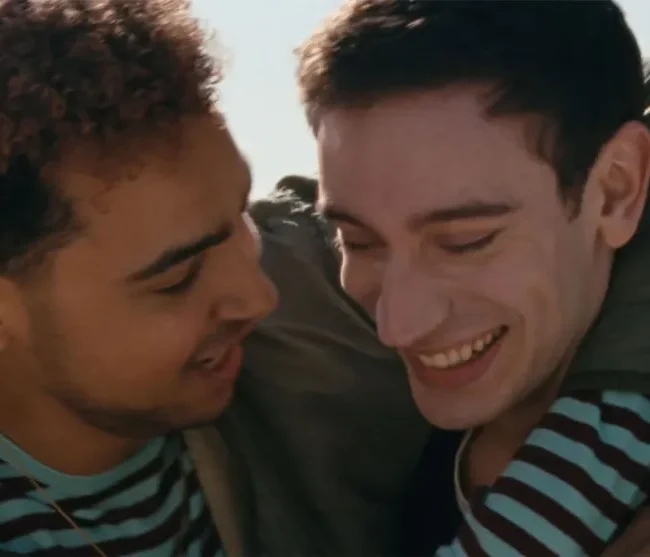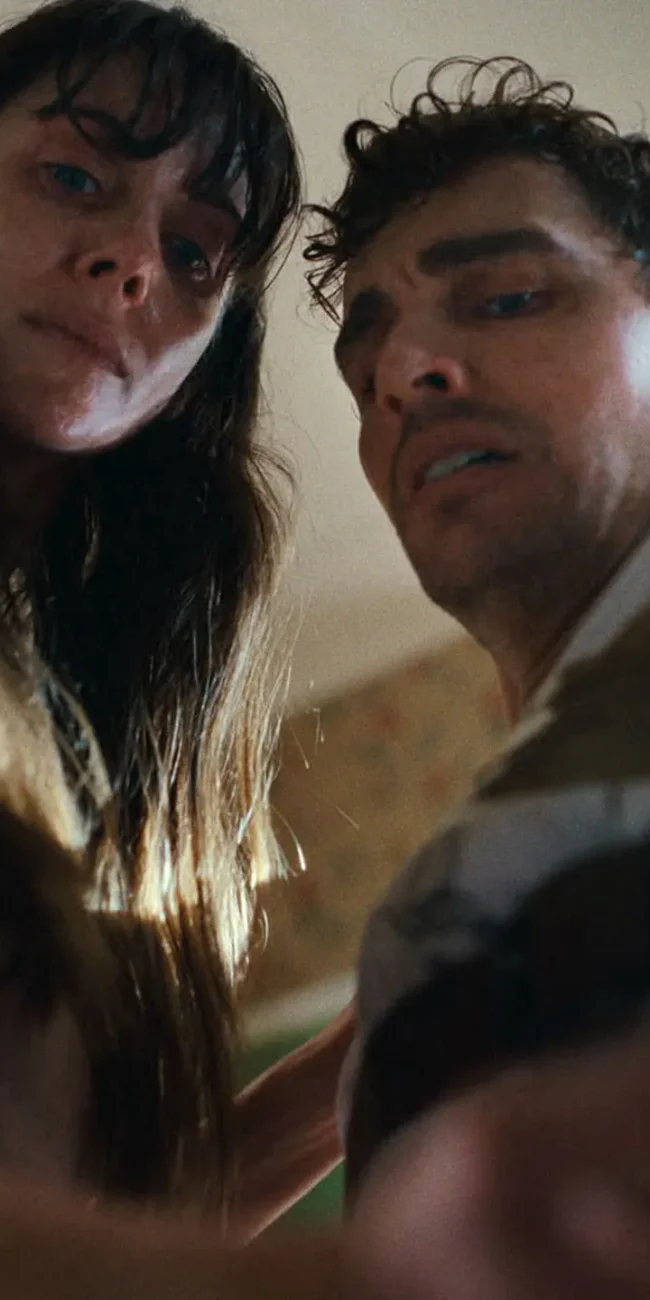NEW DIRECTORS/NEW FILMS 2010 – HTN’s Recommendations
From today through April 4, New Yorkers will be treated to the latest edition of New Directors/New Films. This indispensable program celebrating noteworthy work by younger filmmakers across the globe is put together by the Film Society of Lincoln Center and the Museum of Modern Art, with screenings split between FSLC’s Walter Reade Theater and MoMA. ND/NF’s 2010 batch is typically wide-ranging in terms of style, genre, and national origin. Although we haven’t seen every single film from this year’s series, we’ve sampled enough to come up with a list of favorites to recommend.
Full program information and details about scheduling and ticketing can be found here.
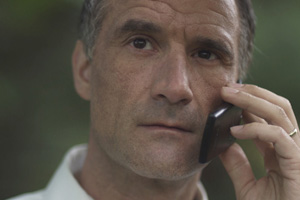 3 Backyards (USA, Eric Mendelsohn, 85m) — Mendelsohn’s second feature is a trio of tales all taking place on the same day in the same Long Island suburb. In one story, a husband and father (Elias Koteas) leaves for a business trip, only to find himself grounded and looking at his own life with new eyes. In another, a housewife and painter (Edie Falco) spends an emotionally charged afternoon with her mysterious movie-star neighbor (Embeth Davidtz). In the third, a young girl (Rachel Resheff) accidentally stumbles onto a world of dark and sinister adult secrets. Although the three stories are intercut with each other, the characters never meet and the plotlines never converge; the connections being drawn here are more a matter of mood and feeling than cause and effect. Mike S. Ryan wrote after seeing the movie at Sundance earlier this year: “Despite its various problems, it is a [truly] ambitious and inventive film that is speaking not only through acting and plot but through its savvy control of music, lensing and pacing. The film’s stylistic choice of ’70s era American New Wave grammar was a joy to behold. …[A] fantastic film.” (Nelson Kim)
3 Backyards (USA, Eric Mendelsohn, 85m) — Mendelsohn’s second feature is a trio of tales all taking place on the same day in the same Long Island suburb. In one story, a husband and father (Elias Koteas) leaves for a business trip, only to find himself grounded and looking at his own life with new eyes. In another, a housewife and painter (Edie Falco) spends an emotionally charged afternoon with her mysterious movie-star neighbor (Embeth Davidtz). In the third, a young girl (Rachel Resheff) accidentally stumbles onto a world of dark and sinister adult secrets. Although the three stories are intercut with each other, the characters never meet and the plotlines never converge; the connections being drawn here are more a matter of mood and feeling than cause and effect. Mike S. Ryan wrote after seeing the movie at Sundance earlier this year: “Despite its various problems, it is a [truly] ambitious and inventive film that is speaking not only through acting and plot but through its savvy control of music, lensing and pacing. The film’s stylistic choice of ’70s era American New Wave grammar was a joy to behold. …[A] fantastic film.” (Nelson Kim)
Bilal’s Stand (Sultan Sharrief, USA, 85m) — Made piecemeal over four years, Sultan Sharrief’s Bilal’s Stand is a brazenly autobiographical, starless, penny-pinching production from Detroit about one black Muslim teen’s decision to go to the University of Michigan despite the naysayers in his family and in the diverse, suburban high school he treks out to in order to avoid the substandard education offered in Detroit’s toxic public schools. Rough around the edges, it’s told with enough freewheeling inventiveness and first-person verve that it transcends its obvious financial limitations and offers a glimpse of utterly authentic working-class black life in the industrial midwest. High-energy affairs that deal with young men from rarely represented, strict and insular communities who try to rise out of their circumstances to pursue their desires, familial responsibility be damned, have been hot the past few years (uh… Slumdog Millionaire), but none has seemed quite this grounded in the reality of its auteur’s actual milieu. Mixing non-actors playing themselves with trained performers, the film uses a consistent voice-over from Julian Gant’s protag with incredibly witty animations over the live-action footage to illustrate Sharrief’s singularly perceptive and often highly comic worldview. (Brandon Harris)
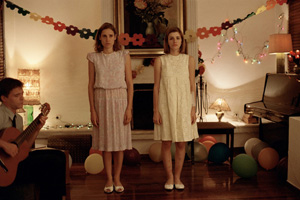 Dogtooth (Greece, Yorgos Lanthimos, 96m) — It isn’t just the letters “d-o-g” in the title that made me think of Ulrich Seidl’s Dog Days while watching Yorgos Lanthimos’ Dogtooth. Something about the Grecian heat and the blackly comic tone conjures a Seidlian spirit. This is another film that everyone appears to be in full support of, to the point where many are already declaring it the best film of 2010. My only question after watching it was a somewhat distracting one: What statement was Lanthimos trying to make? Was it really as simplistic as: “Dear parents/society, if you try to overprotect your children, you’ll only end up making things worse”? Whatever the case, Dogtooth is the type of film that I would have completely flipped out over five or ten years ago, but at this stage, I appreciated and dug it more than I loved it. Having said that, I am anxious to revisit it again now that I know what I’m getting into and I would be shocked if you encounter a more bracingly unique vision at this year’s ND/NF. (Michael Tully)
Dogtooth (Greece, Yorgos Lanthimos, 96m) — It isn’t just the letters “d-o-g” in the title that made me think of Ulrich Seidl’s Dog Days while watching Yorgos Lanthimos’ Dogtooth. Something about the Grecian heat and the blackly comic tone conjures a Seidlian spirit. This is another film that everyone appears to be in full support of, to the point where many are already declaring it the best film of 2010. My only question after watching it was a somewhat distracting one: What statement was Lanthimos trying to make? Was it really as simplistic as: “Dear parents/society, if you try to overprotect your children, you’ll only end up making things worse”? Whatever the case, Dogtooth is the type of film that I would have completely flipped out over five or ten years ago, but at this stage, I appreciated and dug it more than I loved it. Having said that, I am anxious to revisit it again now that I know what I’m getting into and I would be shocked if you encounter a more bracingly unique vision at this year’s ND/NF. (Michael Tully)
The Father of My Children (France/Germany Mia Hansen-Løve, 110m) — A tender but tough-minded tribute to filmmaking and the bonds of family. Grégoire (Louis-Do de Lencquesaing) is an independent movie producer in Paris and a man perpetually on the move. Weekdays he races from one meeting to the next with a cell phone glued to his ear. Weekends he spends at his country house with his beloved wife (Chiara Caselli) and daughters. But when tragedy strikes, family and work are thrown together in wholly unforeseen ways. The Father of My Children’s portrait of a producer navigating the tricky path between art and commerce is deftly drawn and highly engaging from its first scenes, but as the story progresses it shifts before our eyes into something richer and deeper. At one point, Grégoire tells his brooding teenage daughter (Alice de Lencquesaing), “I’d like you to decide to be happy,” and Hansen-Løve leaves it to us to notice that it’s the father who probably wishes he could follow his own advice. That combination—sharp observations coupled with a restraint that respects the viewer’s intelligence—is typical of the film’s quiet profundity. (NK)
The Happiest Girl in the World (Romania, Radu Jude, 99m) — It’s about time accomplished short filmmaker Radu Jude’s feature-length debut has found a home for itself in the States, for it looked like it might get lost in the recent Romanian shuffle (Police, Adjective, Tales From the Golden Age). Jude’s small gem of a picture strikes a lovely, bittersweet note, as a mother and father drive their contest-winning daughter into the city to appear in a television commercial. Though comically understated, the quiet resolution makes one feel a genuine flush of sadness. The Happiest Girl in the World is about how the crushing force of reality—and family—just about always spoils one’s hopes and dreams and during those fragile teenage years. (MT)
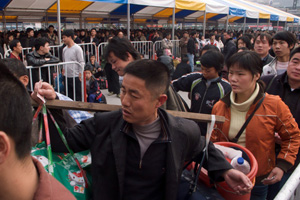 Last Train Home (Canada/China, Lixin Fan, 87m) — Consider me the number one fan of the new Canadian-Chinese Nonfiction New Wave. An indirect companion piece to Yung Chang’s Up the Yangtze, Lixin Fan’s Last Train Home is another devastating marvel that personalizes the far-reaching impact of globalization by focusing on one Chinese family as they struggle to make ends meet. Its early scenes are shocking enough: thousands of factory workers amass at a train station to wait desperately to return to their far-reaching villages for Chinese New Year. But once home, the conflict within the family that Fan has chosen to document becomes even more intimate and volatile. With Last Train Home, Fan has accomplished something very major. It is a special, heartbreaking work that is all the more stunning for being made by such a relative newcomer. (MT)
Last Train Home (Canada/China, Lixin Fan, 87m) — Consider me the number one fan of the new Canadian-Chinese Nonfiction New Wave. An indirect companion piece to Yung Chang’s Up the Yangtze, Lixin Fan’s Last Train Home is another devastating marvel that personalizes the far-reaching impact of globalization by focusing on one Chinese family as they struggle to make ends meet. Its early scenes are shocking enough: thousands of factory workers amass at a train station to wait desperately to return to their far-reaching villages for Chinese New Year. But once home, the conflict within the family that Fan has chosen to document becomes even more intimate and volatile. With Last Train Home, Fan has accomplished something very major. It is a special, heartbreaking work that is all the more stunning for being made by such a relative newcomer. (MT)
The Man Next Door (Argentina, Mariano Cohn and Gastón Duprat, 100m) — This icy, elegantly visualized, and darkly funny satire on Argentine class relations takes place mostly within a single apartment located in a sleek modernist building designed by Le Corbusier. A prosperous interior designer and his wife are surprised when their new neighbor installs a window that looks directly into their home. The neighbor is crude, tacky in dress and speech, doesn’t drive the right kind of car or patronize the right kind of bars—obviously, a deadly threat to the family’s way of life who must be stopped at any cost. The filmmakers skillfully bring us inside the mind of their yuppie-boho protagonist, compelling us to sympathize with him even as they invite us to mock him for his blinkered, privileged narcissism. A cheerfully misanthropic and briskly entertaining piece of work. (NK)
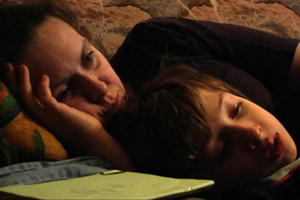 My Perestroika (USA/Great Britain, Robin Hessman, 87m) — It is perhaps unfair that Robin Hessman’s My Perestroika found itself competing against so much more headline-worthy fare in this year’s U.S. Documentary Competition at the Sundance Film Festival, because it accomplishes its mission with an impressive amount of unassuming grace. Unfortunately, unassuming grace rarely translates into awards. But with an expansive program like ND/NF, a film like My Perestroika has a chance to find a more comfortable home. Hessman profiles several adults in present-day Moscow who were raised behind the Iron Curtain as children and are still coming to terms with their country’s dramatic evolution. She lets these individuals speak for themselves, while incorporating footage from the past, to present a nostalgic collage of personal/historical memory and reflection. (MT)
My Perestroika (USA/Great Britain, Robin Hessman, 87m) — It is perhaps unfair that Robin Hessman’s My Perestroika found itself competing against so much more headline-worthy fare in this year’s U.S. Documentary Competition at the Sundance Film Festival, because it accomplishes its mission with an impressive amount of unassuming grace. Unfortunately, unassuming grace rarely translates into awards. But with an expansive program like ND/NF, a film like My Perestroika has a chance to find a more comfortable home. Hessman profiles several adults in present-day Moscow who were raised behind the Iron Curtain as children and are still coming to terms with their country’s dramatic evolution. She lets these individuals speak for themselves, while incorporating footage from the past, to present a nostalgic collage of personal/historical memory and reflection. (MT)
Night Catches Us (USA, Tonya Hamilton, 90m) — It is often debated but generally agreed upon among scholars of the civil rights era that the election of Jimmy Carter (widely embraced by the burgeoning black middle class in the north and midwest) drilled a final nail into the coffin of the more aggressive and militant black power movement. Thus it is striking to hear Mr. Carter’s progressive, southern voice hover over the handsome HD images of Tonya Hamilton’s fascinating look at the last gasps of the Black Panthers in Philadelphia, Night Catches Us. Anthony Mackie plays Marcus, a man haunted by the past who has recently returned to his working class Philadelphia community after years of exile to attend to his recently deceased father. He’s widely despised; his brother (Tariq Trotter of The Roots, who contributed the score) thinks of him as a louse and quitter. An ex-Panther, he’s considered a snitch among the last vestiges of the once vital organization. Thought to have sold out his long dead friend and colleague Neal to the Feds in an attempt to win his away lawyer girlfriend Patricia (Kerry Washington), Marcus doesn’t care much about winning anyone’s trust. Ably directed and wonderfully acted, the film attempts to be both elegy for and condemnation of the various strengths as well as the many excesses of the the black power ideology. (BH)
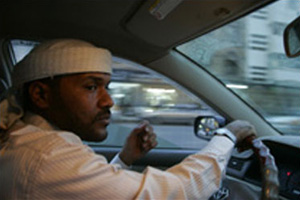 The Oath (USA, Laura Poitras, 95m) — A look inside the troubled heart of an ambivalent jihadist, Laura Poitras’s follow-up to her Oscar-nominated My Country, My Country (to date the most sublime documentary yet about our misadventures in Iraq) is an equally stunning meditation on the costs of extremism and the ways in which the perceived threats of terror, Islam and otherness have perverted our nation’s long held notions of justice and due process. Abu Jindal is a taxi driver in Yemen with a young son and a mountain of debt. He lives in perpetual fear of assassination or capture, having been the US’s central informant after 9/11 regarding the protocols and possible location of Osama Bin Laden and Al Qaeda’s leadership. After serving as Bin Laden’s personal bodyguard and protege from 1997-2000, Jindal yearns for a former life he has all but rebuked, even while he counsels younger men in the ideology of Jihad and regrets the capture and torture of his brother in law, Salim Hamdam, a former driver for Osama Bin Laden, who was held in Guantanamo from 2001 until 2009 and whose trial was the first of our legally ambiguous military tribunals. An act of great love and deep sorrow, The Oath is as essential a documentary as any that will grace American screens this year. Press the masterpiece button now. (BH)
The Oath (USA, Laura Poitras, 95m) — A look inside the troubled heart of an ambivalent jihadist, Laura Poitras’s follow-up to her Oscar-nominated My Country, My Country (to date the most sublime documentary yet about our misadventures in Iraq) is an equally stunning meditation on the costs of extremism and the ways in which the perceived threats of terror, Islam and otherness have perverted our nation’s long held notions of justice and due process. Abu Jindal is a taxi driver in Yemen with a young son and a mountain of debt. He lives in perpetual fear of assassination or capture, having been the US’s central informant after 9/11 regarding the protocols and possible location of Osama Bin Laden and Al Qaeda’s leadership. After serving as Bin Laden’s personal bodyguard and protege from 1997-2000, Jindal yearns for a former life he has all but rebuked, even while he counsels younger men in the ideology of Jihad and regrets the capture and torture of his brother in law, Salim Hamdam, a former driver for Osama Bin Laden, who was held in Guantanamo from 2001 until 2009 and whose trial was the first of our legally ambiguous military tribunals. An act of great love and deep sorrow, The Oath is as essential a documentary as any that will grace American screens this year. Press the masterpiece button now. (BH)
The Red Chapel (Denmark, Mads Brügger, 87m) — Filmmaker Brügger travels with two friends—young comedians born in South Korea and adopted at an early age by Danish parents—to Pyongyang, North Korea, where they will perform a comedy revue while carrying out Brügger’s secret mission of documenting the horrors of life under despotism. Pamela Cohn wrote in her HTN review: “[W]hat at first seems like a Python-esque charade played just for laughs, manages to provide plenty of fiercely sobering moments. …Brügger is a ferocious cultural insurgent, the camera his most potent weapon. His film will force you to double over with belly laughs. It will also chill you to the bone.” An additional note: I think Brügger is partially satirizing himself here, as well as his audience’s expectations. The Red Chapel is both a fine example of the documentary-as-exposé and a sly deconstruction of same. Kim Jong-il’s police state is the obvious target, but there are others: the Western traveler with his ready-made “insights” into exotic lands, the moralist blind to his own mistreatment of those around him, the truth-telling documentarian who lies to get the footage he wants. The constant shifts in tone are executed with such a glancingly light touch that it’s nearly impossible to be certain when The Red Chapel is putting us on and when it’s not—and Brügger and his accomplices surely aren’t telling. (NK)
Samson and Delilah (Australia, Warwick Thornton, 101m) — In a remote Aboriginal community in central Australia, quiet desperation is rampant and petty brutality a normal means of conflict resolution. For the title characters, a pair of young adults who struggle to retain a few shreds of dignity amidst the barren red clay, things quickly go from bad to worse. Although they have next to nothing going for them, their community of discriminated-against Aboriginals proves even less hospitable than for most. After the death of her grandmother, Delilah (Marissa Gibson) is cast aside by her angry, stick-wielding aunts, while Samson (Rowan McNamara) huffs the days away until he interrupts his unforgiving brother and his porch-sitting ska band with a shocking dose of violence. Exiled, the two try to forge a life for themselves elsewhere, with predictably dire results. Crisply shot in HD, Warwick Thornton’s feature debut centers around this pair of dispossessed young lovers with an air of unyielding authenticity and deftness at discarding the clichés of young love. (BH)
Women Without Men (Germany/Austria/France, Shirin Nestat, 95m) — As ambitious and timely as any film in the field, fine artist turned filmmaker Nestat’s narrative debut documents the CIA-sponsored coup that toppled Dr. Mohammad Mosaddegh’s democratically elected, left-leaning government from the perspective of five disenfranchised women from every strata of contemporaneous Iranian society. While Women Without Men is often shot like a perfume ad on steroids, Ms. Nestat and her collaborators have bravely shone a light on the various ways oppression manifests itself in a patriachal, theology-obsessed nation, even one as sophisticated and modern as the state formerly known as Persia. (BH)
— Nelson Kim








